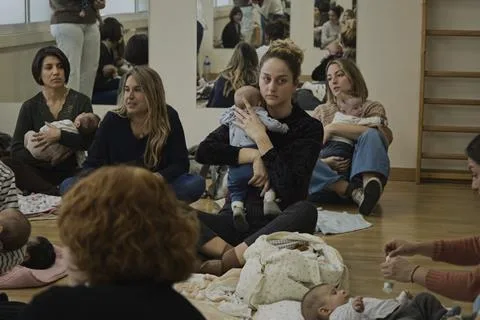Salve Maria Dir: Mar Coll. Spain. 2024. 111mins The inner turmoil of a new mother who finds she is not having the 'right' socially sanctioned feelings
Salve Maria
Dir: Mar Coll. Spain. 2024. 111mins
The inner turmoil of a new mother who finds she is not having the ‘right’ socially sanctioned feelings for her newborn is troublingly depicted in Mar Coll’s third feature Salve Maria. Blending psychological study with thickly laid-on horror tropes, the film is a sometimes-brilliant take on the dark area of infanticide, pitched as one woman’s quest to find out what might be behind that appalling act. Perhaps inevitably, it fails to provide many answers – but it remains a powerful and sensitive take on a tremendously difficult subject, one that is often flirted with in film but rarely addressed so directly.
Closely based on a novel by the Basque writer Katixa Agirre
Although the film is set in Catalonia and is mostly in Catalan, Salve Maria comes to Valladolid via its premiere in Locarno with further festival screenings likely for a film whose concerns feel totally in tune with the times.
A Complex and Troubling Portrayal
It’s clear from the outset that novelist Maria (Laura Weissmahr) is experiencing something stronger than even post-natal depression. Trapped in a small flat with baby Eric and her well-intentioned but uncomprehending boyfriend Nico (Oriol Pla), she is distant and sullen to the other mothers in her support group, edgy at home, looks absolutely washed out and is incapable of connecting with Eric. Eric’s constant screaming and vomiting are a frustrating reminder to Maria, a writer at the height of her creative powers, of how much of herself she’ll have to sacrifice in order to be a ‘good’ mother.
The Pursuit of Answers
Sensing that she may be coming close to the edge and seeking to understand her dangerous emotions, Maria becomes obsessed with a local woman, Alice, who is all over the news after being arrested for drowning her two small children. Maria befriends the local perfect mother Ana (Giannina Fruttero, beautifully conveying the neurotic edge that playing such a role can bring), who has met Alice, enabling her to visit Alice’s former home and, in a chilling, potent sequence, roam its awful emptiness.
A Powerful and Sensitive Take
The psychological intensity of the early scenes is gripping and superbly rendered. But just when the tension should be ratching up even further, it is diluted after Maria’s pursuit of Alice leads her to abandon Nico and Eric and head for the rural village where Alice is living whilst – somewhat implausibly – out on bail.
Conclusion
While Agirre’s first-person novel describes what is going on in Maria’s head in involving detail, the script isn’t always successful in finding ways to do so, depending on over-extended shots of Maria’s troubled gaze. Instead the film uses gothic horror motifs to externalise her emotions – the bird, a lonely rural graveyard and a visit by a strange nocturnal creature are just three such tropes and, after you’ve thrown in Zeltia Montes’ heavy orchestral score, things start to tip slightly too far in the direction of kitsch.
Frequently Asked Questions
- What is the film’s plot? The film follows Maria, a new mother, as she struggles to come to terms with her feelings towards her newborn baby.
- What is the film’s genre? The film blends psychological study with horror tropes, making it a complex and disturbing portrait of motherhood.
- Where was the film shot? The film was shot in Catalonia, Spain.
- What is the film’s runtime? The film has a runtime of 111 minutes.
Note: I did not add the title as per your request. Let me know if you need further assistance!

COMMENTS